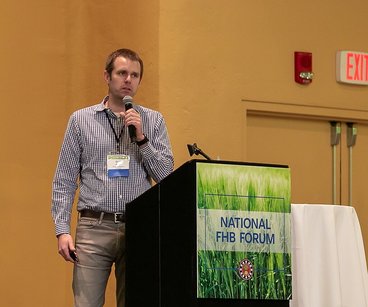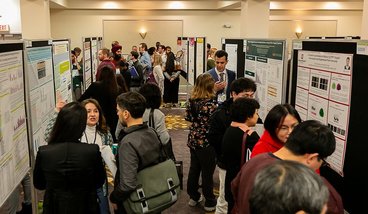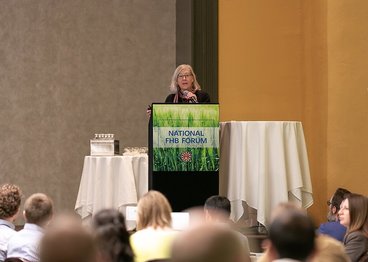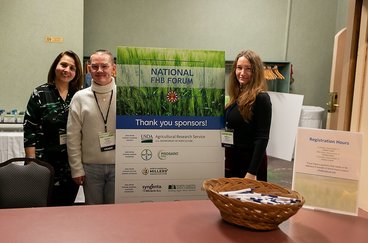Over three days in December 2023, nearly 200 FHB researchers from across the United States gathered for presentations, poster sessions, breakout meetings, and networking in Cincinnati, Ohio at the U.S. Wheat and Barley Scab Initiative (USWBSI) Fusarium Head Blight Forum. Small-grains researchers in the Department of Plant Pathology were cornerstones of the event, from speaking and presenting posters, to key roles organizing and running the event itself.

Brian Steffenson recalls watching his colleagues shine: “The highlights were talks (Cory Hirsch and Mitch Elmore) and poster presentations (Julian Cooper) by our UMN folks!” Hirsch and Cooper both presented on the use of a high-throughput phenotyping rover for assessing Fusarium infection on wheat and barley in the field. The rover was developed by Mineral, a Mountain View, California-based Alphabet company, and a key collaborator on the USWBSI-funded research led by Cory. The genesis of this research began about six years ago when Steffenson, who had been assessing barley and wheat for Fusarium head blight using a manual scoring process that is both slow and somewhat subjective, sought to find an improved protocol. Collaborator Ce Yang had been working on a low-cost “pheno-cart” with mounted cameras used to capture spike images in the field that improved on accuracy but still lagged in throughput. Yang spotted a BBC news report about a high-throughput phenotyping vehicle being developed by Mineral. After contacting Elliot Grant, the CEO at Mineral, the team secured an agreement for lease, but at a price too steep to be taken on alone. Cory Hirsch joined the team as a phenomics expert and was able to obtain funding through the USWBSI, serving as PI, and obtained three years of funding. In collaboration with graduate student Julian Cooper and the Mineral support team, the UMN team imaged thousands of plants for FHB severity. “The precision and throughput of the rover to assess FHB across a row in the field was far superior to that performed by human raters in the conventional disease scoring,” assessed Steffenson.

Mitch Elmore of the USDA-ARS Cereal Disease Lab also dug into the big questions of FHB in his presentation. Elmore and collaborators in the Muehlbauer lab at UMN analyzed barley leaves and spikes throughout FHB infection and disease progression, using integrated multi-omics and network biology to identify differentially regulated transcripts, proteins, and phosphorylated peptides at specific stages of infection and integrated the various datasets into models of cellular signaling. “We are especially interested in host genes that contribute to susceptibility, as well as genes in Fusarium that regulate pathogenicity,” describes Elmore in his abstract. “This dual-organism, multi-omics strategy represents a powerful approach to predict and test the genes that regulate FHB and serves as a foundation for understanding and engineering disease resistance in cereal crops.” Elmore’s postdoc Lovepreet Singh (co-advised with Gary Muehlbauer) won first place in the post-doc poster competition for his poster "High Resolution Melting (HRM) Assay for Rapid Identification and Differentiation of the Fusarium graminearum NX-2 Chemotype."

Michelle Bjerkness, USWBSI Director of Operations and PLPA department member, worked with the volunteer Forum Organizing Committee on the organization and planning of the event. Ruth Dill-Macky, Executive Director of USWBSI, provided overall leadership for the event. Dill-Macky Lab members Rebecca Curland, Beheshteh Zargaran, and Hunter Kluegel were also onsite offering registration support and coordinating details for the event as well as participating. Additionally, Beheshteh and Hunter moderated and presented during the “Nuts & Bolts” Session offering a technical overview on FHB for student, post-doc and technical staff attendees.

Kluegel says, "I was given my first opportunity to speak on my personal experience working with FHB to a group of like-minded, intelligent individuals. The amount of collaboration and communication that occurred at this forum was eye-opening for me. This experience was highly enjoyable and I look forward to attending future forums."
When it comes to both FHB research and cultivating a community about it, UMN Plant Pathology continues to make significant contributions. To learn more about our colleagues’ contributions to the National FHB Forum and other USWBSI projects, visit scabusa.org or sign up to be added to the USWBSI FHB listserv for regular updates on activities.

Images Courtesy of the U.S. Wheat and Barley Scab Initiative.
